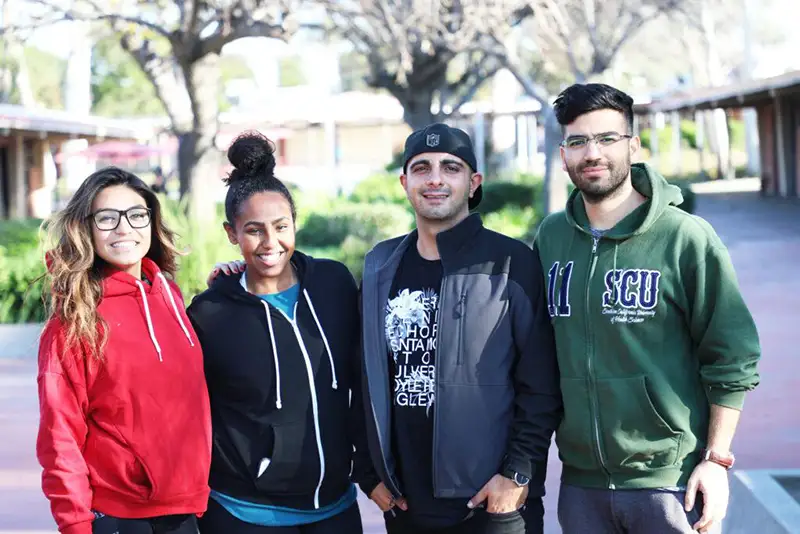Financial Aid
Undergraduate Aid
There are four main types of financial aid for college students including grants, scholarships, loans, and work-study funds. Here’s more information about the aid available at SCU.
- Federal Pell Grant: This grant is awarded to undergraduate students based on estimated family contribution, cost of attendance, and enrollment status. You can receive this grant for a maximum of six years, which includes time attending other campuses.
- Federal Supplemental Education Opportunity Grant (SEOG): This federal grant does not need not be repaid for undergraduate students. It is awarded based on exceptional financial need and availability of funds.
- Cal Grant: The State of California offers the Cal grant to California residents. This is a need-based grant to undergraduates that also factors in your high school GPA or your GPA from the last college you attended. The yearly application deadline for each Fall term is March 2nd, and the application requires a FAFSA for the upcoming year and a GPA verification form. If you already have a Cal grant and wish to have it applied to SCU, please contact the California Student Aid Commission.
- Work-Study: The Federal Work-Study Program (FWS) provides jobs for undergraduate students with financial need, allowing you to earn money to help pay for your education-related expenses. The program encourages community service work and work that’s connected to your program of study. For a list of available job opportunities, please visit Work-Study for more information.
- SCU Scholarships: A number of scholarships are available. Visit our scholarship page for the list.
- Federal Direct Loans: Loans that are part of the Direct Loan program borrow directly from the government. Terms of the loan are covered in greater detail in the required Entrance Counseling and Master Promissory Note. Loan repayment begins six months after you graduate, withdraw, or drop below half-time status. Direct Loan programs for underhttps://www.scuhs.edu/financial-aid/?activetab=scholarshipsgraduate students include:
- Federal Direct Subsidized Loan: are loans made to eligible undergraduate students who demonstrate financial need to help cover the costs of higher education at a college or career school.
- Federal Direct Unsubsidized Loan: are loans made to eligible undergraduate students, but eligibility is not based on financial need
- Federal Direct Parent PLUS Loan: are loans made to parents of dependent undergraduate students to help pay for education expenses not covered by other financial aid. Eligibility is not based on financial need, but a credit check is required. Borrowers who have an adverse credit history must meet additional requirements to qualify.
- Private Loan: Loans are credit-based funding provided by external, nonfederal lenders to help cover educational costs. Take into consideration repayment terms, interest rates, and deferment options before choosing a private loan. Some lenders may require a co-signer for credit reasons. For students who apply through a lender on the Fast Choice website, the loan funds will be disbursed electronically, allowing for an efficient process for the borrower and the school.
- Veterans Education Benefits: SCU is involved with several government-sponsored programs to repay veterans for their service and sacrifice and to help ensure their opportunity to receive a valuable education in a variety of disciplines of integrated healthcare. SCU supports student veterans through its participation in several successful programs sponsored by the VA. SCU accepted veterans programs or covered programs are listed below.
- CHAPTER 30 (MGIB-AD) Montgomery GI Bill® for Active Duty
- CHAPTER 1606 (MGIB-SR) Montgomery GI Bill® Selected Reserve
- CHAPTER 31 (VR&E) Vocational Rehabilitation & Employment*
- CHAPTER 32 (VEAP ) Post-Vietnam Era Veterans Educational Assistance Program
- CHAPTER 33 Post 9/11 GI Bill®
- CHAPTER 35 (DEA) Survivors’ and Dependents’ Educational Assistance Program
- Employer Provided Educational Assistance Benefits: Section 127 of the IRS allows employers to offer their employees up to $5,250 annually in tax-free educational assistance for undergraduate or graduate-level courses. Please check with your employer if they participate in this educational assistance program.
* Vocational Rehabilitation can be used based on the approval of your Vocational Rehabilitation Counselor.

